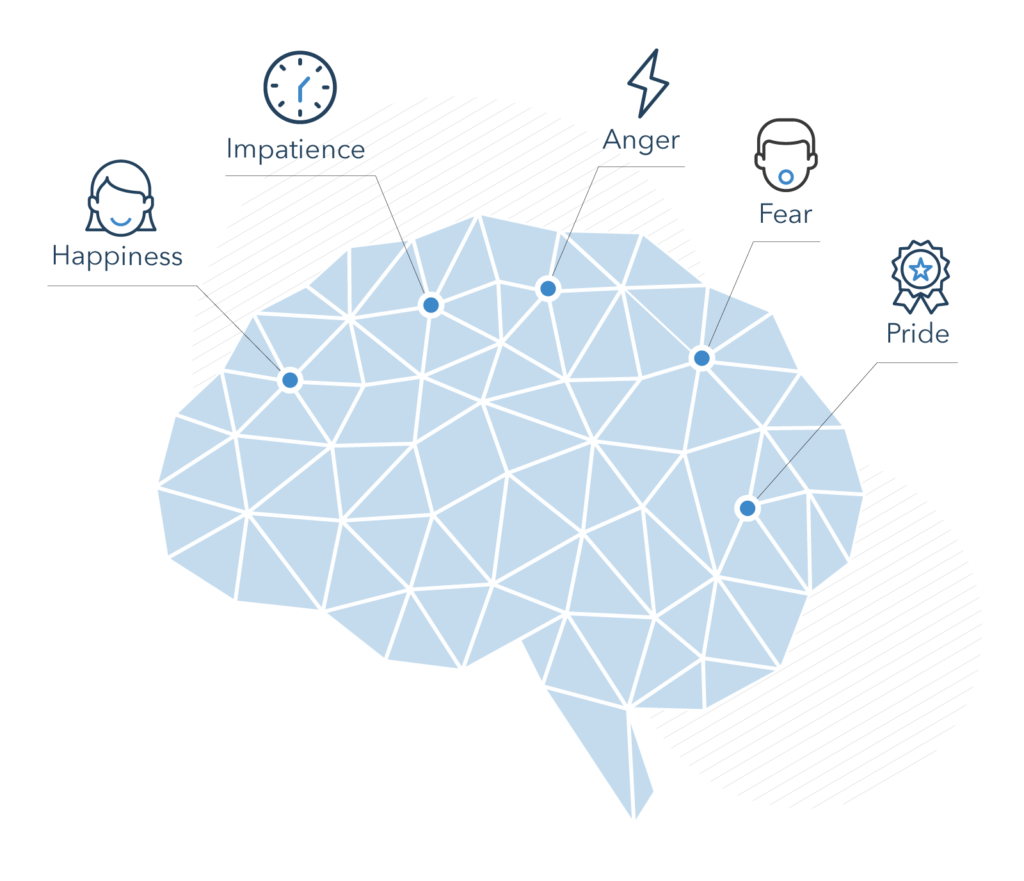
What is Trading Psychology?
“Trading psychology” refers to a trader’s state of mind while they are actively trading. It could determine how much profit they are able to make or it could provide an explanation for why a trader sustained big losses.
Inborn human characteristics like biases and emotions are important in trading psychology. Studying trade psychology is primarily intended to raise awareness of the various risks associated with negative psychological qualities and to encourage the development of more positive traits. Experts in trading psychology often don’t act irrationally or emotionally. As a result, individuals stand a better chance of profiting from trading or, at the very least, of minimising their losses.
Every trader’s trading psychology is unique since it is shaped by their own emotions and preconceived biases. Among the emotions that have an effect on trading are:
- Happiness
- Impatience Anger
- Fear
- Pride

How to improve your Trading in Psychology?
It will be simpler for you to develop your trade psychology if you are aware of your own emotions, prejudices, and personality traits. When you are aware of these, you can develop a trading strategy that takes them into account to try to reduce their potential influence on your decision-making.
For instance, if you are naturally confident, you may find that pride and overconfidence limit your capacity for decision-making. For instance, you could decide to let losses build up in the hopes that the market would turn around rather than accepting a little loss on your trading account. This could lead to bigger losses or the eventual closure of your trading account.
How Does Bias Affect Trading?
Since biases are, by definition, a blatant preference for one product over another, they have an effect on trade. As a result, they could cloud your judgement and encourage you to make trading decisions based more on emotion than on sound fundamental or technical analysis.
This is due to the fact that due to trading bias, you may be more inclined to trade an asset on which you have previously had success or to stay away from an asset on which you have previously suffered a loss. In order to overcome them and approach the markets with a more measured and logical mindset, it is crucial for traders to be aware of their conscious biases.
There are 5 main types of Bias:
- The term “representative bias” refers to the tendency to repeat or remain with profitable investments in the past. Because it has worked out for you in the past, you might do this without conducting analysis for every trade of this kind. However, even if two trades appear to be identical, it is crucial to approach each transaction on the basis of its own merits rather than past performance.
- Negativity bias makes you more likely to overlook the positive aspects of a trade than the unfavourable aspects. This could result in you abandoning a whole approach when, in reality, you may only have needed to make a small adjustment to achieve success.
- Status quo bias is the tendency to adhere with the status quo, to employ tried-and-true methods or practises rather than seeking out novel ones. The risk appears when you don’t determine whether those outdated techniques are still effective in the current marketplace.
- When you seek out or give more weight to news and analysis that supports your pre-formed opinions, this is known as confirmation bias. You could also choose to ignore or not look for information that contradicts your beliefs.
- You commit the gambler’s fallacy when you believe that just because an asset has been rising, it will keep rising. Similar to how there is no reason why a coin should land tails side up – rather than heads – after doing so several times in a row, there is no reason to think that it should.
7 Tips to Avoid Emotional Trading
1. Identify your personal Traits
2.Develop and follow Trading Plan
3.Have Patience
4.Be Adaptive
5.Take a break after a loss
6. Accept your Winnings
7.Keep a Trading Log
- Identify your personal Traits: One of the keys to developing sound trading psychology is the capacity to early identify your personality attributes. You must be absolutely honest with yourself and accept any tendencies towards impulsive behaviour or irrational tendencies.If this is the case, it is important to keep these traits under check while actively trading because they could cause you to make impulsive decisions without enough analytical backing. But it’s also essential to play to your individual talents.As mentioned above, it’s just as important to be aware of your prejudices as it is of your personality traits and feelings. Despite the fact that prejudices are a normal aspect of human nature, you should be aware of them before entering or departing any deals.
- Develop and Follow Trading Plan: You must have a trading plan in place if you want to succeed. A trading plan, which serves as the framework for your trading, should include your time commitments, available trading cash, risk-to-reward ratio, and a trading strategy you feel comfortable using.A trading plan might state, for example, that you’ll spend an hour trading every morning and evening and won’t risk more than 2% of your portfolio’s total value on any one trade. This can assist you in limiting losses and the influence of emotions on your trading because the rules for opening or cancelling a deal have already been laid out for you.
- Have Patience: You must be patient with your positions because discipline is fundamentally about being patient. You run the danger of closing a trade prematurely and incurring a loss when you make decisions based on feelings like fear. Have confidence in your analysis, and exercise restraint and patience. The same goes for trying to enter a trade; it’s important to be patient and to wait for the right moment to do so rather than doing it right away.For instance, if you were to speculate on specific GBP currency pairs like EUR/GBP or GBP/USD, you might want to wait until just before a Bank of England (BoE) announcement because there is normally higher volatility at this time.
- Be Adaptive: Even while it’s crucial to have a trading strategy, keep in mind that no two trading days are alike and that winning streaks are unheard of. With this in mind, you should practise evaluating how the markets change on a daily basis and making adjustments.You may decide to suspend your trading until you are certain that you understand what is occurring if there is higher volatility on one day than the day before and the markets are moving very erratically. Being adaptable can help you control your emotions, eliminate representative and status quo biases, and judge each scenario on its own merits, allowing you to be pragmatic while trading.
- Take a break after a loss: It is often best to take a quick pause from your trading account to collect your thoughts and compose yourself rather than instantly initiating another transaction in an effort to make up some of your losses.Traders who accept losses and use them as learning opportunities are the most successful. They normally take a few minutes to themselves before going back to their stage. They analyse what went wrong with that particular deal at this time in an effort to learn from it and avoid repeating the same error.
- Accept your Winnings: It’s just as important to give up when you’re ahead and collect your profits as it is to stop after suffering a loss. A string of triumphs or one particularly significant victory may make you feel invincible, at which time you may change positions and attempt to repeat the process.You can even start a run of new positions in the markets since it is “your day” today in the hopes that none of them will end in a loss. As a result, you can end yourself taking unwise risks or diversifying your portfolio too quickly without first doing your homework on each market.
- Keep a Trading Log: By keeping a trading journal, you may record all of your gains and losses as well as your emotions throughout each trade. It so serves as a summary of all the prior concepts covered in this essay. You can use it to evaluate the wisdom of the choices you made at any given period.An asset’s ultimate price as well as the moment you decided to cut your losses can both be recorded in a trading log. By doing this, you can assess if you made the right decision or not.
Trading psychology summed up
- Trading psychology is all about how you feel while you are trading, and it might help to explain why you made money or lost money.
- Before accepting a position, it’s crucial for you to be conscious of your own shortcomings and prejudices, but it’s also crucial that you comprehend your own advantages.
- Although winning streaks don’t exist in trading and each position should be evaluated on its own merits, it’s important to learn from both your victories and losses.
- It might make the difference between a good day and a terrible day on the markets to know when to grab a profit or cut a loss.
Disclaimer: The information above should only be used for educational reasons as it is only an opinion. You can email us if you have any comments or questions regarding this story. You can contact us through our contact page.
FOLLOW OUR WEBSITE: https://learningsharks.in/
FOLLOW OUR PAGE: https://www.instagram.com/learningsharks/
